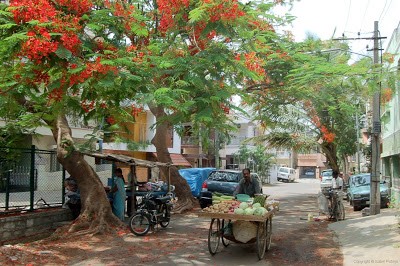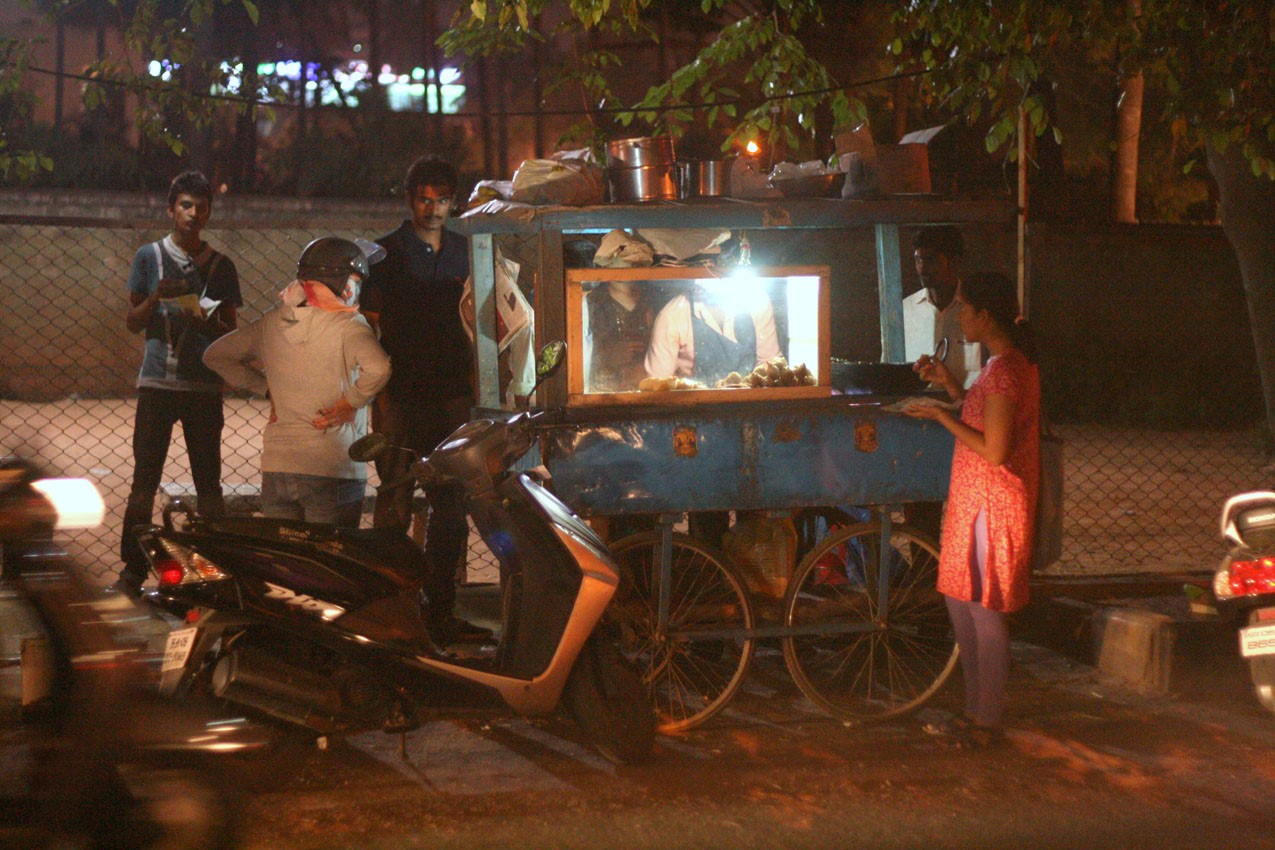They whispered to me through the strangely synchronized sounds of vehicles trotting on the teeming road. They called out to me as my eyes darted across the dangling lights hanging in each store. They lurked in the smell of crispy hot dosas and boiled rice that cooked in every alternate house. It has been exactly a year. I had walked down this street with Mutacha.
The Gulmohar trees that lined along the road broke into a  sudden fight, violently shaking their branches at each other, hurling several buds across the road, one of which landed straight on my head. I remember how these trees made Mutacha furious. He believed that the Gulmohar would make a very bad mother as it had no control over its children which kept falling down on every head that passed by. He would just pick them up and fling them back, continuously abusing the tree for the next five minutes as we walked on.
sudden fight, violently shaking their branches at each other, hurling several buds across the road, one of which landed straight on my head. I remember how these trees made Mutacha furious. He believed that the Gulmohar would make a very bad mother as it had no control over its children which kept falling down on every head that passed by. He would just pick them up and fling them back, continuously abusing the tree for the next five minutes as we walked on.
After he had calmed down, his wrinkled rough hands clung onto mine as we strode on the footpath. We were searching for ‘Prashant chai podi’ ulla chaya (tea made with Prashant tea powder). I don’t know what deep connection he had with that unknown local brand when there were so many known ones like Tata Agni or Taj. It is to do with that name- Prashant chai.
The man just refused to drink any other. I hated how he managed to make every single chai shop we visited, laugh at us when we asked for a cup of Prashant chai. Images of the chai walas disgusted expression followed us as we left their shops. None of this affected Mutacha. He was very sure there would be one sensible man, an expert in his field, who would know the importance of using this tea powder. Surprisingly, we actually found such a man. He stood within four wooden poles and a sheet on the top, with a small hole, which I think was his chimney.
Outside hung a board with bold letters written across – ‘Prashant chai’. Mutacha walked beyond his pace, stumbling on every stone and dragging me along. He chuckled and said to me, “kando! (Look)”. The chai wala was very happy when he saw us. He quickly made 2 cups of piping hot ‘Prashant chai’ and we sipped it from the kuppi glass along with two Marie biscuits.
I again sat on the very same bench today drinking Prashant chai even though I had discovered that the tea was not actually made of Prashant chai podi. And there was only one Marie biscuit.
Opposite the chai shop, Philip tube lights leaned lazily against the pigeon pooped walls of ‘Spicer Super Market’. Mutacha was very excited to buy a replacement for the tube light in the hall that was never given a chance to come on.
Though people at home would helplessly crash into the corners of the sofa and table, he refused to make things easier for them by just shining their path with some light. ‘Off man’ was what Ammama called him as he could never see the switch as an inverted pyramid.
He believed in saving electricity for the future generations. He climbed up the chair, which he emphasised was as old as Amma, proudly holding the tube light in his hands. Within seconds he crashed down to the ground, both his hands stretched out high, the tube light held tight. “Tube light pottilya!”
I smiled as I walked on. Somebody was frying bajjis and bondas. The sizzle continued as I took the road further down. The lane revealed a small cart set up with several people crowded around it. Mutacha and I had come here to eat aloo bonda and perrupu vada served with a blob of green chutney on a piece of Bangalore Mirror.
He was fascinated by how such big aloo bondas could cost just one rupee when the bakery sold aloo buns for twelve rupees! That was when Mutacha lost faith in buying from the bakery.
The next day, Mutacha ended up with chikungunya and I, with viral fever. The entire family, including his five brothers and two sisters and his wife’s five sisters and two brothers scattered across Bombay and Kerala, with their exclusive talent of googling and self-analyzing the cause of our illness, blamed it on the bajji- bonda man.
We were thereafter banned from eating there. I decided to take the risk of breaking this promise we had made today. I stood alone and ate aloo bonda on the Bangalore mirror paper. A lot had changed. He had upgraded his menu with samosas and jalebis. The date on the paper I got my bonda in had changed. The bonda seemed a bit empty.

Three street dogs were fighting over a packet of idly vada that someone had accidentally dropped on the road. That torn and brutally murdered packet immediately reminded me of Mutacha’s purse. It was more than forty years old and torn in every possible angle, but Mutacha refused to buy a new one. For his birthday one year, Amma had gifted him a purse which was larger with more compartments. Mutacha readily accepted it and put his old purse into the new one. Nobody ever bothered trying to change his mind again. He was very possessive and particular about several things like this.
Another obsession was with his haircut. Although his hair never grew beyond 5 centimeters in length, the minute he saw that his hair was a bit more that 3 centimeters long, he would immediately wear his pant, white shirt and run to the barber. The packet of idly vada lay strewn across the road as I leaped over it and moved on.
When Mutacha and I had walked down this street, it was surprising how every alternate person that had walked past us knew him. “Hello Parameshwaran!” they called out. He would raise his hand to a perfect 60 degrees and give a semi- formal salute (the military man that he was) and carry on.
Sometimes, when I asked him who they were, he would chuckle and say that he would have told me if he knew himself. Today, this same street and the people who walk past me seem alien as nobody knows me without him by my side. To them, I am just another passerby.
Somewhere near the end of the street is a shop known for its bananas. Mutacha was crazy about them. He believed that a meal is incomplete without eating a banana. I would stand there, as he poked his finger into each bunch, judging which one had the longest lifespan.
We would then carry a minimum of two kilos back home. As I walked past that shop today, uncle asked me where Mutacha was and started taking out his balance to weigh our usual two kilos. I didn’t say anything. I just took the packet from his hand and walked back home. Something heavier than those two kilos was now pulling me down.
Roshini Raghunathan
Latest posts by Roshini Raghunathan (see all)
- Kitchen sink realism hits new levels with the Karawaypala - 19th January 2019
- Prashant chai podi ulla chaya - 5th March 2017





